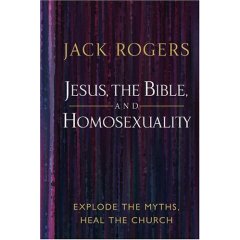20th entry - A Controversial Christian Book and its Author

Recently I came across this article in Detroit News that made me raise an eyebrow. Titled "Minister finds Bible backs gay clergy and marriage", the article was about how an American Presbyterian church leader, Jack Rogers, in Southern California changed his opinion about marrying and ordaining gays in churches. Initially opposed to homosexuality, Rogers went through a process of theological scholarship and became a vocal advocate of ordaining gays and marrying gay couples in the church.
The article reads as follows:
"In 1993, Jack Rogers grudgingly agreed to serve on a task force studying whether his local Presbyterian church in Southern California should ordain gays.
Quite frankly, he wasn't interested in giving the topic serious thought. "I opposed homosexuality reflexively -- that was just what I thought Christians were supposed to do," he recalls.
But once he did embark on a scholarly journey, the Presbyterian minister found that his views changed 180 degrees: He's become a vocal advocate of ordaining gays and marrying gay couples in the church.
"I am so convinced that Jesus and the Bible, rightly understood, support the equality of all persons, including gays and lesbians, and that the church cannot continue going against its central values," says Rogers, 72, a former Presbyterian Church U.S.A. "moderator," the denomination's top leader.
"We can't keep making a group of people pariahs. Jesus would never have stood for it," he stresses.
How an evangelical Christian's views changed so dramatically on an issue that has divided his church since 1976 is mapped out in fascinating detail in "Jesus, the Bible and Homosexuality: Explode the myths, heal the church."
His thoughtful new book, which recounts "how the church changed its mind on other moral issues," couldn't be more timely: Presbyterians will again weigh the place of gays in the church at their June 15-22 General Assembly.
Rogers' turnabout came in part from his scholarly reading of the Bible verses mentioning homosexuality. He concluded that cherry-picking verses to try to justify prejudices ignores the ancient Near East's cultural norms, fails to address other verses suggesting different interpretations and disregards the Scriptures' central, loving message about the life of Jesus.
Asking fellow Christians to temporarily take off 21st-century spectacles, Rogers shows how the Presbyterian leaders deriding blacks and women in the 19th century sounded eerily like the ministers of today who brand those of us who are gay as sinful.
Back then, Rogers notes, most Americans believed women and blacks were especially sinful and that the Bible told them so: Both were viewed as morally inferior to white male Christians, sexually threatening and deserving of punishment.
Leading ministers confidently grounded their defense of slavery and the subordination of women in biblical verses, endorsing as simply part of God's divine plan practices now recognized as abhorrent. (See Genesis 9:22-25, Ham's sin of seeing his father naked; and Genesis 3:16, Eve's sin of eating forbidden fruit and sharing it with Adam.)
Presbyterian theologian Robert Dabney, laying out the slippery slope argument of his day, warned soon after the Civil War that allowing black men to be ministers would lead to race mixing. He later called the push for women's rights "a new attack on God's Word."
Society -- and the church -- of course changed, not the Bible.
"We changed our minds because we changed the way we read the Bible -- from proof-texting to looking at the Bible as a whole and especially through the lens of Jesus' life and ministry," Rogers says. "Most people don't pay attention to history. They say, 'Oh, that was different.' No, it is the same."
Jack Rogers' Bible study led him to see the light about gay people. He has faith his beloved church will soon have a similar revelation."
Currently, I feel that Christian leaders like Rogers are few and far between. Most do not pay much attention to historical contexts and many prefer instead to apply scripture literally. A fellow Christian brother of mine once said, and which I agree, that literalists often do not apply scripture consistently, as they only pick and choose what they want to follow. To me, what is worse is that they like to impose their views on others, judging those who fail to meet their standards (even though they might fall short of their own standards).
Nevertheless, I think that its nice to know there are Christians out there who are willing to stand up for their beliefs even if they appear to oppose mainstream conservatives. I am no activist myself but in my heart I cheer whenever I come across one and I secretly admire them for their courage. In my own passive way I support them - by writing about them and trying to tell others about these "heroes". To me, they are even more heroic than gays fighting for their own rights and decrying discrimination, simply because of their selflessness - they do not even gain anything by speaking up for the underdog! If such people dont deserve admiration, who does?

0 Comments:
Post a Comment
<< Home